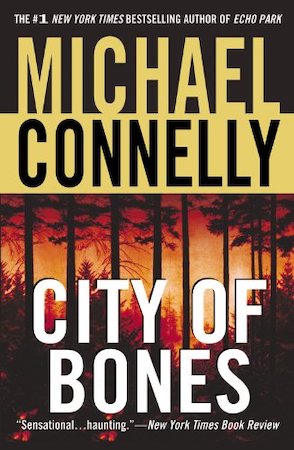With long-standing series, no matter their genre, there is always the danger of incurring in a repetitive formula, one that might offer the comfort of a pleasant read, granted, but also one that could ultimately lead to boredom: this is not the case – so far – with Michael Connelly’s Harry Bosch series: this author has the gift of making his stories feel always fresh and engaging, and his main character shows definite signs of change as his age and outlook on life evolve, most probably thanks to the parallel, real-life evolution of his creator.
In this 15th book we find Bosch still investigating cold cases for the Open-Unsolved Unit, and the twenty year old one he and his partner David Chu have just been assigned promises to be a weird one: the DNA analysis on a trace of blood found on the victim just came up with a correspondence in the police database, pointing to a serial offender. Problem is, at the time of the rape and murder of young Lily Price, the offender, Clayton Pell, was 8 years old, so either the crime lab made a mistake, or the detectives who processed the case did: Bosch and Chu really have their work cut out for them… But since there is no rest for the weary, they are also unexpectedly called to a fresh scene, that of a fall from a hotel balcony that could either be murder or suicide: Bosch’s presence has been directly requested by his old nemesis, councilman Irving, because the deceased is his own son George and Irving wants to be assured of the best police work available. No matter his past differences with Bosch, the councilman admits his admiration for the detective’s integrity and wants no one else to deal with the situation.
The book’s title obviously refers to George Irving’s fall from the hotel balcony, but it’s also the acronym for the Deferred Retirement Option Plan, the scheme that allowed Bosch to temporarily return to active duty and that is now reaching its limit: in a little over three years he will have to retire for good, and while that might prove a good opportunity to be a full-time father for his teenage daughter, the detective is not sure he’s ready to give up his life’s mission. This awareness colors his actions and thoughts as he tries to juggle both cases and for the first time in his life feels he might not be up to the task, that his keen instincts might be somewhat dulled by the passage of time.
This might be one of the reasons behind his truly cantankerous treatment of partner David Chu, who is practically kept in the dark about the cold case investigation and used for mostly menial tasks: granted, Chu is young and somewhat inexperienced, and he’s guilty of a serious misstep at some point, but Bosch’s attitude here is inexcusable and stresses the darker side of his character. I appreciate how Connelly shows both the best and the worst of his creature: one does not necessarily have to like a book character to enjoy the way it is portrayed, and I found that it’s refreshing to see how the drive to seek justice for the victims can lead to negative behavior, even for the “hero” of the story.
The dual investigation itself is the propulsive force in the story: on one side there is the search for the murderer of young Lily Price, a trail that in the end points toward a serial killer who acted undisturbed and undiscovered for over two decades; on the other there is the difficult scrutiny into George Irving’s last hours, a case with delicate political implications that might lead to upheavals in the higher echelons of both police force and city administration. These two different and unconnected stories turn the book into a compelling, fast-paced read where each new discovery raises the stakes and makes you eager to get to the truth: while there is never any doubt that Bosch will be able to find the solution to the mysteries he’s dealing with, the process is always a fascinating one and one that never ceases to intrigue me.
At the end of the book, Harry Bosch shows how this recent experience changed him, even if only a little: he acknowledges the rude treatment of his partner and makes some friendly overture that points toward some mellowing of his trademark uncompromising attitude. Maybe the pain of a betrayal from a very unexpected corner taught him that people can be hurt, and that he needs to take human weaknesses into account when dealing with other people. Or maybe fatherhood has melted some of the ice that encases his soul… No matter what, Harry Bosch remains a very intriguing character who I hope will keep being interesting for a long, long time still.

















You must be logged in to post a comment.